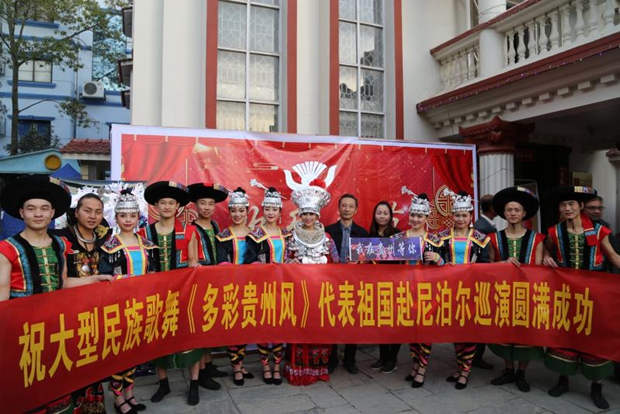China-Nepal: BRI & emblem of cultural resurgence
- By Saroj Gautam
 0 Comment(s)
0 Comment(s) Print
Print E-mail China.org.cn, June 12, 2018
E-mail China.org.cn, June 12, 2018

Virtue is not left to stand alone. He who practices it will have neighbors -- Confucius
It is six decades since China and Nepal established formal diplomatic tie, yet the people to people exchanges stretch far back. Recorded history shows that the exchanges between two peoples traces back to 5th century.
Cultural and language interactions between two peoples have recently improved. The Belt and Road Initiative (BRI) seems to be bridging not only physical and digital developments but also the cultural aspirations of both sides.
Some people in Nepal had wondered why China was so late to establish a cultural center in neighboring Nepal, yet it was established in March 2015; it has already made its presence felt within a short time. "There are only 35 Chinese cultural centers across the world, and one is in Nepal, we are not late," says director Yin. Nonetheless Mr. Yin is convinced that the cultural and language gap as a major factor is still compromising the people-to-people acquaintances.
The number of private institutions offering Chinese lessons has sprung up in the past few years in Nepal. There are hundreds of language volunteers from China active in Kathmandu. Mushrooming Chinese language institutes and frequent exhibitions of Chinese art and culture by the culture center are just some cases in point. Nepal's largest language college, Biswa Bhasa Campus, with its limited quota and resources, has to disappoint hundreds of aspirants every year who are keen to learn mandarin.
On the other side, a campaign to establish a "Nepal Center" in Chinese universities is underway. According to Nepali Ambassador to China Leela Mani Paudyal, Nepali universities supply teachers and help to develop courses in such centers. Translation from Nepali to Chinese and vice-versa are increasing with the efforts of an expert team formed by Nepal Academy.
Recent data shows that the number of Chinese tourists visiting Nepal has surpassed other nationalities including Indians. Within three months between January-March 2018, the number has increased by 38 percent in comparison to same period last year. And it is not one sided. The crowds in the visa section of Chinese embassy in Kathmandu speaks volumes about the growing number of Nepalese visiting China.
Considering the increasing number of Chinese tourists, the Nepal Tourism Board has recently launched an interactive website in Chinese. During the inauguration ceremony of the website, Minister of Culture, Tourism and Civil Aviation, Rabindra Adhikari and Chinese Ambassador to Nepal Yu Hong echoed optimism for increased people-to-people connectivity.
There are many connecting aspects between China and Nepal in terms of culture and tradition. For instance, in China there are many followers of Buddhism and Nepal is the birth place of Lord Buddha. In Chinese philosophy the phrase "three teachings" refers to Confucianism, Taoism and Buddhism which is considered a harmonious collective.
Likewise, when Chinese celebrate Spring Festival, some Nepali communities celebrate "Losar" at a similar time and in a similar spirit. The Nepali embassy has recently launched the "Lumbini" campaign in certain cities to publicize the birth place of Lord Buddha among Buddhists and the number of pilgrim tourists from China to Lumbini has substantially increased lately. Likewise, Lake Manasarovar in China is place of pilgrimage for people from Nepal and India. The place can even become a point to promote trilateral cultural networks.
Nepal missed the opportunity offered by globalization led by America in the post second world war era. Analysts say the BRI is next opportunity that Nepal can't afford to miss. Fortunately, it is initiated by the next-door neighbor with close ties.
Saroj Gautam writes on International Relations and Diplomacy from Kathmandu. He is associated with AP1HD Television in Nepal.
Opinion articles reflect the views of their authors only, not necessarily those of China.org.cn.






Go to Forum >>0 Comment(s)